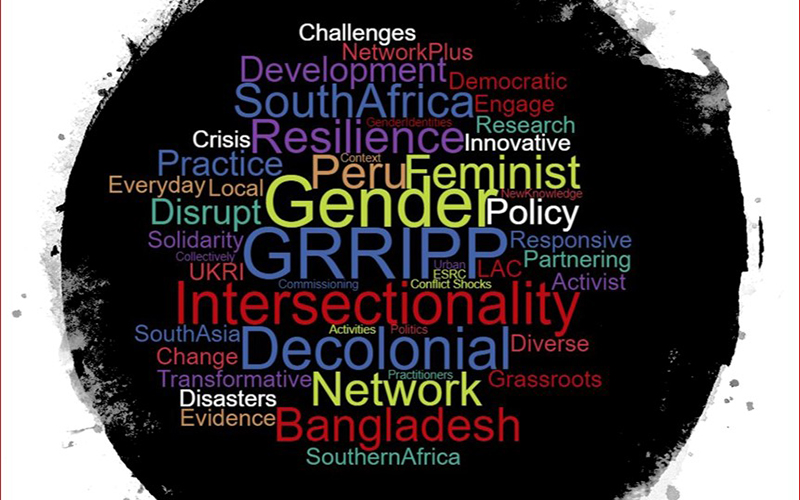GRRIPP: Gender Responsive Resilience & Intersectionality in Policy and Practice
Networking plus partnering for resilience. A UKRI Collective fund award

16 November 2019
The project develops knowledges that are critical and situated, indigenous and de-colonial; establishing in-country research needs across different timeframes; collectively identifying the major indigenous problems which require our whole team's attention.
Total award value:
£4.8 million
- Project Outline
GRRIPP brings together partners from Latin America and Caribbean (LAC), Southern Africa, South Asia and the UK to disrupt mainstream development discussions on gender. Launch date: 1st November 2019.
Too often humanitarian and development programmes have “gender equality” as a “value added” aspect of projects rather than as a central goal. And too few organisations engage with how overlapping aspects of discrimination, such as gender, race and class (known as intersectionality), interact and exacerbate development challenges for women and girls. These challenges increase in situations of urban-based disasters and conflict, where pre-crisis resilience may be low.
Humanitarian and development actors need more gender- and intersectionality-sensitive research in order to transform policy and practice to be more gender- and intersectionality-responsive. In other words, aid actors need to better understand how the politics behind gender identities affects people’s everyday experiences in order to offer more appropriate, contextualised interventions.
This outcome requires organisations to engage with indigenous and decolonial perspectives on gender and discrimination in crisis contexts. It also requires a grounded evidence base built on experience from researchers, practitioners and activists at the grass roots level.
Bringing diverse local actors and their experiences to the table is exactly what GRRIPP aims to achieve. With core project partners based in LAC, Southern Africa, South Asia and the UK, our network will collectively and democratically determine an agenda for change: facilitating knowledge exchange; enhancing solidarity; creating spaces for constructive dissent; and building an evidence base informed by grassroots knowledge and experience.
Our particular focus will be on resilience and with a special emphasis on gender responsive infrastructure; we seek to understand and enhance people’s resilience to shocks, and support the development of more sustainable infrastructure, in all its diverse forms.
We are also excited to have the opportunity in our second year to launch an innovative “Commissioning Programme” for a range of projects and activities in the Global South, which means we will be able to fund and support local initiatives directly. The remit of this programme will be developed democratically based on the priorities of partners in our focus regions – so watch this space.
With a horizontal and feminist structure and a solidarity ethos, GRRIPP won’t just produce new knowledge, it will offer a new way of working together for change.
- Partners
IRDR
University of Durham, Middlesex University
Pontificia Universidad Catolica del Peru
University of Dhaka
Northwest University (South Africa)
Durban University of Technology
CARE Peru
Loughborough University
- Team
- Principal Investigator: Professor Maureen Fordham, UCL Inst for Risk and Disaster, Centre for Gender and Disaster, UK
- Co-I Professor Camillo Boano, UCL Development Planning Unit, UK
- Co-I Professor Peter Sammonds, UCL Inst for Risk and Disaster, UK
- Co-I Dr Punam Yadav, UCL Inst for Risk and Disaster, Centre for Gender and Disaster, UK
Other UK Co-Investigator
- Professor Sarah Bradshaw, Middlesex University School of Law, UK
- Dr Ksenia Chmutina, Loughborough University, Civil and Building Engineering, UK
- Dr Jessica Field, Brunel University, UK
- Dr Hanna Ruszczyk, Durham University, Geography Department, UK
International Co-Investigator
- Professor PABLO VEGA CENTENO SARA LAFOSSE, Catholic University of Peru (PUCP), Peru
- Dr Mahbuba Nasreen University of Dhaka, Bangladesh
- Professor Cheryl Potgieter, Durban University of Technology, South Africa
 Close
Close

